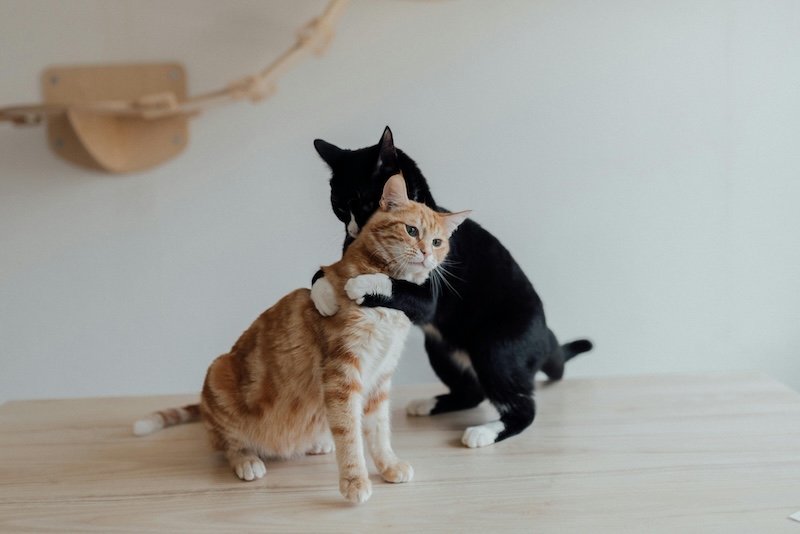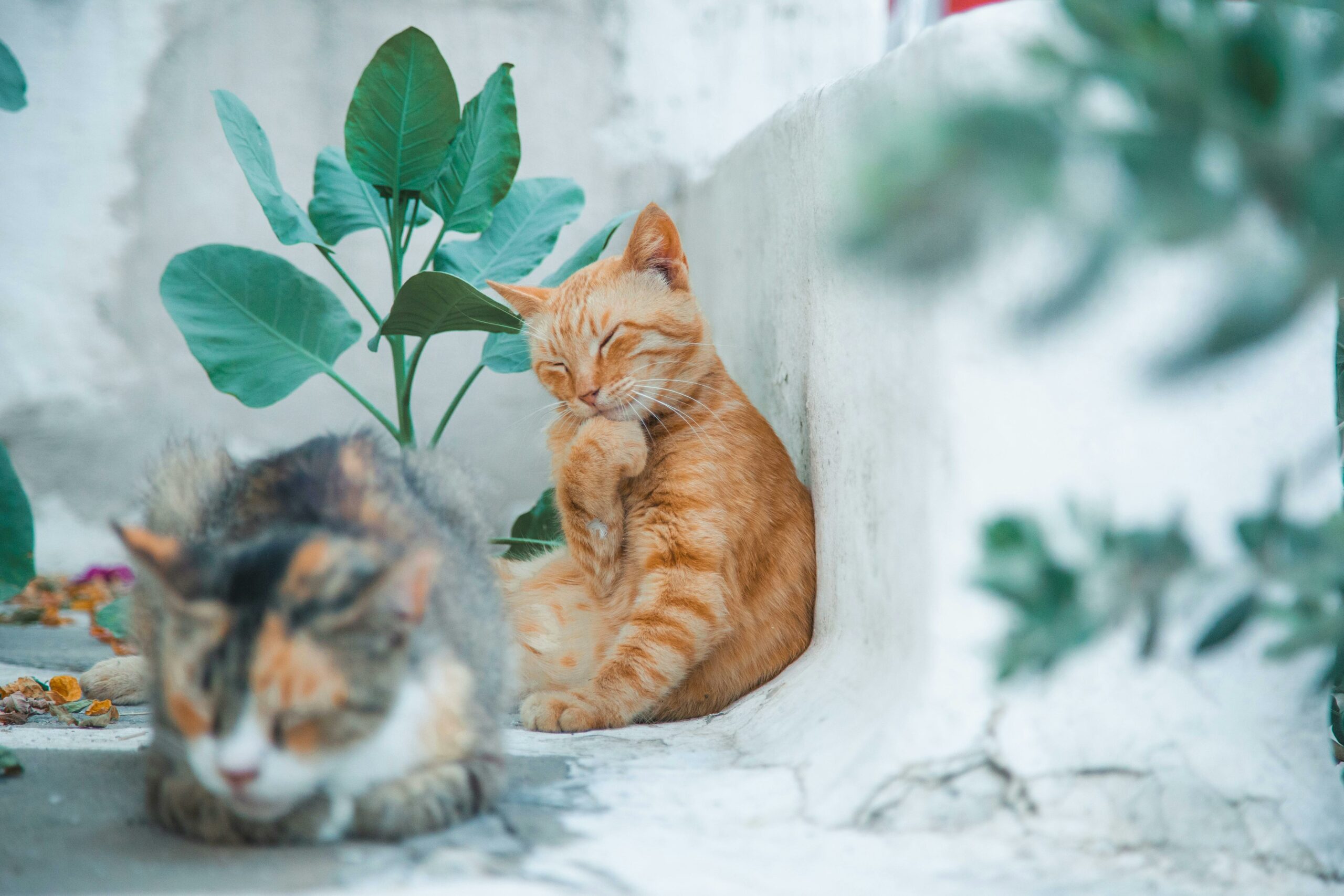- What is feline chlamydia?
- What is the feline chlamydia vaccine?
- How does the feline chlamydia vaccine work?
- How much does the feline chlamydia vaccine cost?
- How often do cats need the feline chlamydia vaccine?
- Does pet insurance cover the cost of the feline chlamydia vaccine?
- What are the potential side effects of the feline chlamydia vaccine?
- FAQs
This article was approved by Lemonade’s favorite vet, Dr. Stephanie Liff.
With the health of our furry friends being as important as our own, understanding the costs and benefits of pet vaccinations is crucial. On average, the cost of the feline chlamydia vaccine is $25 to $60 per dose in 2025.
As a “non-core”, or nonessential vaccine, you’ll need to consult your vet to determine if your kitty needs this protection.
Let’s break down everything you need to know about the feline chlamydia vaccine.
Or if you’re short on time, click below for a handy timeline of all the vaccinations your furry friend will need during kittenhood, plus a vaccination record template to help keep track of their vaccination schedule.
What is feline chlamydia?
Feline chlamydia, also known as chlamydophila felis, is a bacterial infection that affects cats’ ocular and respiratory systems—meaning your feline friend may experience eye irritation or difficulty breathing. It’s highly contagious, especially in environments where many cats live closely together, such as catteries and multi-cat households. Cats can contract the infection through direct contact with secretions from an infected cat’s eyes or nose.
Symptoms often include:
- Conjunctivitis (inflammation of the eye)
- Sneezing
- Nasal discharge
- Pneumonia, in severe cases
When it comes to treatment, Lemonade’s vet expert Dr. Liff advises, “Chlamydia is a bacterial infection and so there is effective antibiotic therapy that can be used if a pet contracts the disease.”
It’s important for cat owners to follow the veterinarian’s dosage and schedule as the treatment usually lasts several weeks to ensure the infection is fully cleared.
Keep in mind, that this disease is different from chlamydia in humans. Feline chlamydia affects cats’ eyes and respiratory systems, while human chlamydia, caused by Chlamydia trachomatis, is a sexually transmitted infection of the urogenital tract. Each has distinct transmission methods and health implications, requiring appropriate care for both species.
What is the feline chlamydia vaccine?
The feline chlamydia vaccine is designed to protect cats from chlamydophila felis, which is the bacteria responsible for feline chlamydia. This vaccine is often included in combined vaccines like the FVRCP shot, which also protects against feline rhinotracheitis, calicivirus, and panleukopenia.
This makes it easier for pet owners to make sure that their cats are protected against multiple infectious diseases with a single injection.
How does the feline chlamydia vaccine work?
Just like other cat vaccinations, the feline chlamydia vaccine works by stimulating the cat’s immune system to produce antibodies without causing the disease itself. When a cat receives the feline chlamydia vaccine, it introduces a small, harmless amount of the antigen (a substance that triggers an immune response) from the chlamydophila felis bacteria.
This helps the cat’s immune system recognize and fight off the real bacteria if exposed in the future. Therefore, vaccinated cats are less likely to develop the clinical signs of chlamydiosis, such as conjunctival inflammation and respiratory tract infections.
Besides the feline chlamydia vaccine, nonessential (or “non-core”) vaccines, given based on the risk factors of the cat—like their lifestyle—could include Feline Leukemia or (very rarely) Feline Bordetella. The “core” or essential vaccines your cat needs will typically include rabies and FVRCP (Feline Viral Rhinotracheitis, Feline Calicivirus, and Feline Panleukopenia).
How much does the feline chlamydia vaccine cost?
On average, the cost of the feline chlamydia vaccine ranges from $25 to $60 per dose. Low-cost vaccination clinics or animal shelters may offer it at a reduced price, especially when included in a package with other essential pet vaccinations.
This cost can also vary depending on factors such as:
- Where you live
- Whether it is administered at a veterinary clinic or a low-cost vaccination clinic
- If it’s part of a vaccination package
- Whether it is administered as part of the combination FVRCP vaccine
How often do cats need the feline chlamydia vaccine?

There is no perfect, one-size-fits-all-paws kitten vaccination schedule. As a non-core vaccine, your vet may or may not recommend the vaccine depending on your kitty’s lifestyle, so it’s best to make these decisions together with your vet.
However, a typical feline chlamydia vaccination schedule will include a kitten vaccination series of three doses, administered as follows:
- First dose: Administered at six to eight weeks old
- Second dose: Administered at 10 to 12 weeks old
- Third dose: Administered at 14 to 16 weeks old
After the initial series, cats will need boosters every one to three years, depending on their lifestyle. For example, if your cat spends lots of time outdoors or in boarding facilities, they could benefit from the extra protection of a yearly booster.
However, if your cat is a couch potato spending their time snuggling on the couch, your vet may recommend that they receive the vaccine once every three years.
Does pet insurance cover the cost of the feline chlamydia vaccine?
Yes, pet insurance usually can include wellness coverage for vaccinations, including the feline chlamydia vaccine, when they’re administered or supervised by a licensed vet. But the specifics will depend on the coverages you chose when signing up, as well as the co-insurance you selected.
When you include the Puppy/Kitten Preventative Care Package on your Lemonade Pet policy, for example, your kitten will be eligible for coverage on up to six vaccines a year—which could include the initial feline chalmydia vaccine and boosters.
This package could also help cover the costs associated with microchip implantation, spay/neuter procedures, heartworm prevention, flea and tick prevention, heartworm tests, and more.
For adult cats, Lemonade’s Preventative Care or Preventative+ Package also includes up to three vaccinations per year, which could help cover the costs of the feline chlamydia vaccine.
What are the potential side effects of the feline chlamydia vaccine?
Most cats tolerate the feline chlamydia vaccine without any adverse reactions, but mild side effects can occur, including:
- Slight discomfort at the injection site
- Lethargy
- Low-grade fever
Rarely, cats may experience more severe reactions including:
- Vomiting
- Facial swelling
- Anaphylaxis, which means your cat may not be able to breathe correctly
If you notice any severe or unusual reactions after your cat receives the vaccine, contact your veterinarian immediately. They can provide guidance and, if necessary, administer treatment to manage any adverse reactions.
Before we go…
Vaccinating your cat against feline leukemia is a proactive step in safeguarding their health and well-being. Investing in pet insurance early in your kitten’s life can help provide your fur fam with extensive coverage—from non-core vaccines to unforeseen accidents and illnesses as they grow up into adult cats.
Did you know that at Lemonade Pet you can cover your kitty with cat insurance from the time they’re two months old?
Click below to get your quote started today.
FAQs
Can indoor cats get feline chlamydia?
While the risk is lower for indoor cats, they can still contract feline chlamydia through indirect contact, such as shared bedding or toys with infected cats. Vaccination is recommended even for indoor cats.
Can the feline chlamydia vaccine be given with other vaccines?
Yes, the feline chlamydia vaccine is often included in combination vaccines like FVRCP, which protects against multiple diseases with a single injection.
What should I do if my cat misses a vaccine booster?
If your cat misses a booster, schedule an appointment with your vet as soon as possible. They can advise on how to get back on track with the vaccination schedule.
Is it safe to administer the feline chlamydia vaccine alongside medications?
Generally, the vaccine can be given alongside other medications, but always inform your vet about any treatments your cat is currently undergoing. By knowing the medications your cat is taking, your vet can effectively manage any potential interactions.
How effective is the feline chlamydia vaccine in preventing the infection?
While vaccination can significantly reduce the risk of infection and severity of symptoms if exposed, no vaccine guarantees complete immunity.
A few quick words, because we <3 our lawyers: This post is general in nature, and any statement in it doesn’t alter the terms, conditions, exclusions, or limitations of policies issued by Lemonade, which differ according to your state of residence. You’re encouraged to discuss your specific circumstances with your own professional advisors. The purpose of this post is merely to provide you with info and insights you can use to make such discussions more productive! Naturally, all comments by, or references to, third parties represent their own views, and Lemonade assumes no responsibility for them. Coverage and discounts may not be available in all states.




